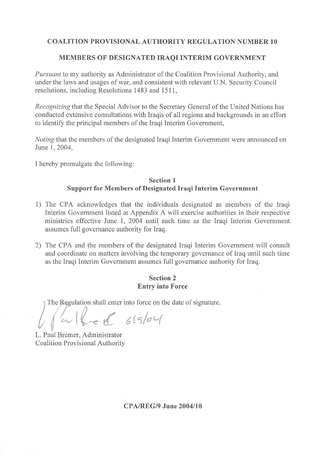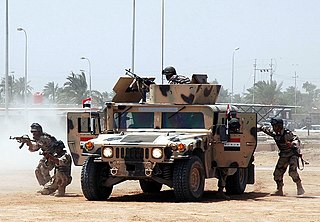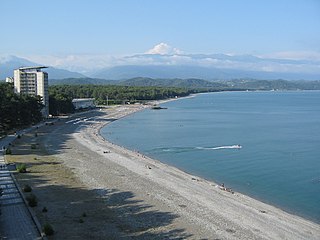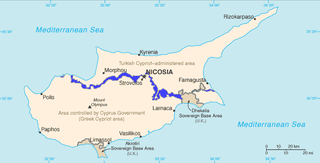
United Nations Security Council resolution 1546, adopted unanimously on 8 June 2004, after reaffirming previous resolutions on Iraq, the Council endorsed the formation of the Iraqi Interim Government, welcomed the end of the occupation and determined the status of the multinational force and its relationship with the Iraqi government.

The United Nations Mission in Liberia (UNMIL) was a United Nations peacekeeping operation established in September 2003 to monitor a ceasefire agreement in Liberia following the resignation of President Charles Taylor and the conclusion of the Second Liberian Civil War (1999–2003). At its peak it consisted of up to 15,000 UN military personnel and 1,115 police officers, along with civilian political advisors and aid workers.

United Nations Security Council Resolution 1700, adopted unanimously on August 10, 2006, after recalling previous resolutions on Iraq, particularly resolutions 1500 (2003), 1546 (2004), 1557 (2004) and 1619 (2005), the Council extended the mandate of the United Nations Assistance Mission in Iraq (UNAMI) for a further period of twelve months until August 10, 2007.

United Nations Security Council Resolution 1723, adopted unanimously on November 28, 2006, after recalling previous resolutions on Iraq, the Council extended the mandate of the multinational force until the end of 2007.
United Nations Security Council Resolution 1790 was adopted unanimously by the United Nations Security Council on December 18, 2007, extending the mandate of the multinational force in Iraq until December 31, 2008. The mandate had been established in 2004 by Security Council resolution 1546 and previously extended by resolutions 1637 and 1723.

United Nations Security Council resolution 872, adopted unanimously on 5 October 1993, after reaffirming resolutions 812 (1993) and 846 (1993) on the situation in Rwanda and Resolution 868 (1993) on the security of United Nations operations, the council stressed the need for an international force in the country and therefore established the United Nations Assistance Mission for Rwanda (UNAMIR).

United Nations Security Council resolution 881, adopted unanimously on 4 November 1993, after reaffirming resolutions 849 (1993), 854 (1993), 858 (1993) and 876 (1993) concerning the Georgian–Abkhazian war, the Council extended the mandate of the United Nations Observer Mission in Georgia (UNOMIG) until 31 January 1994.

United Nations Security Council resolution 1174, adopted unanimously on 15 June 1998, after recalling resolutions 1031 (1995), 1035 (1995), 1088 (1996), 1103 (1997), 1107 (1997), 1144 (1997) and 1168 (1998), the Council extended the mandate of the United Nations Mission in Bosnia and Herzegovina (UNMIBH) for a period terminating on 21 June 1999 and authorised states participating in the NATO led Stabilisation Force (SFOR) to continue to do so for a further twelve months.

United Nations Security Council resolution 1271 was adopted unanimously on 22 October 1999, after reaffirming all resolutions on the situation in the Central African Republic, including resolutions 1159 (1998), 1201 (1998) and 1230 (1999). The Council extended the mandate of the United Nations Mission in the Central African Republic (MINURCA) until 15 February 2000 with a view to its transition from a peacekeeping operation to a post-conflict peace-building presence.
United Nations Security Council resolution 1444, adopted unanimously on 27 November 2002, after reaffirming all resolutions on the situation in Afghanistan, particularly resolutions 1386 (2001) and 1413 (2002) and resolutions 1368 (2001) and 1373 (2001) on terrorism, the council extended the authorisation of the International Security Assistance Force (ISAF) for a period of one year beyond 20 December 2002.

United Nations Security Council Resolution 1936, adopted unanimously on August 5, 2010, after recalling all previous resolutions on the situation in Iraq, including resolutions 1500 (2003), 1546 (2004), 1557 (2004), 1619 (2005), 1700 (2006), 1770 (2007), 1830 (2008) and 1883 (2009), the Council extended the mandate of the United Nations Assistance Mission in Iraq (UNAMI) for a further period of 12 months, until July 31, 2011.

United Nations Security Council resolution 1471, adopted unanimously on 28 March 2003, after reaffirming all resolutions on the situation in Afghanistan, the Council extended the mandate of the United Nations Assistance Mission in Afghanistan (UNAMA) for an additional period of twelve months until 28 March 2004.

United Nations Security Council resolution 1510, adopted unanimously on 13 October 2003, after reaffirming all resolutions on the situation in Afghanistan, particularly resolutions 1386 (2001), 1413 (2002) and 1444 (2002), and resolutions 1368 (2001) and 1373 (2001) on terrorism, the council extended the authorisation of the International Security Assistance Force (ISAF) for a period of one year and expanded its operations outside the capital Kabul to other areas.

United Nations Security Council resolution 1511 was adopted unanimously on 16 October 2003, after reaffirming previous resolutions on Iraq, particularly 1483 (2003), 1500 (2003), and Resolution 1373 (2001) on terrorism. The council urged countries to contribute towards a multinational force to maintain security and called for power to be returned to the Iraqi people as soon as possible.

United Nations Security Council resolution 1536, adopted unanimously on 26 March 2004, after reaffirming all resolutions on the situation in Afghanistan, particularly Resolution 1471 (2003), the council extended the mandate of the United Nations Assistance Mission in Afghanistan (UNAMA) for an additional period of twelve months until 26 March 2005.
United Nations Security Council resolution 1604, adopted unanimously on 15 June 2005, after reaffirming all resolutions on the situation in Cyprus, particularly Resolution 1251 (1999), the Council extended the mandate of the United Nations Peacekeeping Force in Cyprus (UNFICYP) for an additional period until 15 December 2005.

United Nations Security Council resolution 1623, adopted unanimously on 13 September 2005, after reaffirming all resolutions on the situation in Afghanistan, particularly resolutions 1386 (2001), 1413 (2002), 1444 (2002), 1510 (2003) and 1563 (2004), and resolutions 1368 (2001) and 1373 (2001) on terrorism, the council extended the authorisation of the International Security Assistance Force (ISAF) until mid-October 2006.
United Nations Security Council Resolution 1642, adopted unanimously on 14 December 2005, after reaffirming all resolutions on the situation in Cyprus, particularly Resolution 1251 (1999), the council extended the mandate of the United Nations Peacekeeping Force in Cyprus (UNFICYP) for an additional period until 15 June 2006.

United Nations Security Council Resolution 1687, adopted unanimously on June 15, 2006, after reaffirming all resolutions on the situation in Cyprus, particularly Resolution 1251 (1999), the Council extended the mandate of the United Nations Peacekeeping Force in Cyprus (UNFICYP) for six months until December 15, 2006.

United Nations Security Council Resolution 1727, adopted unanimously on December 15, 2006, after recalling previous resolutions on the situation in Côte d'Ivoire, the Council renewed an arms and diamond embargo on the country until October 31, 2007.
















